上海市八年级英语知识点复习牛津版.doc
- 格式:doc
- 大小:67.00 KB
- 文档页数:11
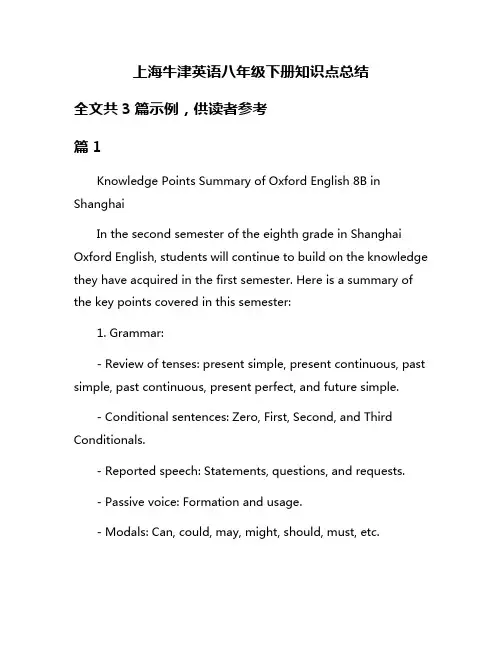
上海牛津英语八年级下册知识点总结全文共3篇示例,供读者参考篇1Knowledge Points Summary of Oxford English 8B in ShanghaiIn the second semester of the eighth grade in Shanghai Oxford English, students will continue to build on the knowledge they have acquired in the first semester. Here is a summary of the key points covered in this semester:1. Grammar:- Review of tenses: present simple, present continuous, past simple, past continuous, present perfect, and future simple.- Conditional sentences: Zero, First, Second, and Third Conditionals.- Reported speech: Statements, questions, and requests.- Passive voice: Formation and usage.- Modals: Can, could, may, might, should, must, etc.- Relative clauses: Defining and non-defining relative clauses.2. Vocabulary:- Phrasal verbs: Break down, come across, get along with, look forward to, etc.- Idioms and expressions: A piece of cake, out of the blue, under the weather, etc.- Collocations: Make a decision, do homework, take a photo, etc.3. Reading and Comprehension:- Reading and understanding different types of texts: Narratives, informational texts, opinion pieces, etc.- Identifying main ideas, details, and implied meanings in a text.- Making inferences and drawing conclusions based on the text.4. Listening and Speaking:- Listening to different accents and understanding native speakers.- Participating in discussions, debates, and role-plays.- Describing events, experiences, feelings, and opinions in a clear and coherent manner.5. Writing:- Narrative writing: Writing stories or recounts using appropriate tenses and sequencing words.- Expository writing: Writing essays or reports with clear organization and supporting details.- Persuasive writing: Writing persuasive essays or argumentative pieces with logical reasoning and strong evidence.Overall, the eighth grade Oxford English curriculum in Shanghai aims to enhance students' language skills in listening, speaking, reading, and writing, while also deepening their understanding of grammar rules and vocabulary usage. By mastering these knowledge points, students will bewell-equipped to communicate effectively in English and further their language learning journey.篇2Shanghai Oxford English Grade 8 Focus SummaryIn the Shanghai Oxford English Grade 8 course, students are introduced to a wide range of English language skills and topics to help them further develop their proficiency in the language. Below is a summary of the key knowledge points covered in the course:1. Grammar:- Students learn about different tenses such as present simple, present continuous, past simple, past continuous, and future tenses.- They also study modal verbs, conditionals, reported speech, passive voice, and relative clauses.2. Vocabulary:- The course covers a variety of vocabulary topics including education, travel, health, technology, environment, and more.- Students practice using new vocabulary in context through reading, writing, listening, and speaking activities.3. Reading and Writing:- Students read a variety of texts including fiction,non-fiction, news articles, and poems.- They learn how to analyze and comprehend texts, identify main ideas, and infer meaning from context.- Students also practice writing different types of texts such as essays, reports, emails, and letters.4. Speaking and Listening:- Students engage in speaking activities to practice expressing ideas, opinions, and thoughts verbally.- They also practice listening to different accents and speeds of English to improve their listening skills.5. Culture and Communication:- The course includes topics on different cultures, customs, and traditions to help students understand and appreciate diversity.- Students learn about effective communication skills such as body language, intonation, and gestures.Overall, the Shanghai Oxford English Grade 8 course aims to provide students with a solid foundation in English language skills and knowledge to help them become effective communicators in both academic and real-world settings. Through engaging activities and topics, students are encouragedto continue developing their English proficiency and confidence in using the language.篇3Knowledge Points Summary of Oxford English for Shanghai Eighth GradeIn the second semester of the eighth grade, students will continue to learn English through the Oxford English textbook. The following is a summary of the key knowledge points covered in the textbook:1. Vocabulary: In the eighth grade textbook, students will learn a variety of new vocabulary words related to daily life, school subjects, hobbies, and more. It is important for students to practice using these new words in sentences to improve their vocabulary retention.2. Grammar: The eighth grade textbook covers a range of grammar topics, including verb tenses, prepositions, adverbs, and more. Students should pay close attention to these grammar rules and practice using them in sentences and conversations.3. Reading Comprehension: The textbook includes a variety of reading passages for students to practice their reading comprehension skills. Students should focus on understandingthe main ideas of the passages, identifying key details, and making inferences based on the text.4. Writing: Writing exercises in the eighth grade textbook focus on developing students' ability to write clear and coherent paragraphs. Students should practice organizing their ideas, using proper grammar and punctuation, and revising their writing for clarity and coherence.5. Speaking and Listening: Students will have opportunities to practice their speaking and listening skills through dialogues, role-plays, and discussions in the textbook. It is important for students to actively participate in these activities and practice speaking and listening in English as much as possible.Overall, the Oxford English textbook for the eighth grade provides a comprehensive overview of key English language skills, including vocabulary, grammar, reading, writing, speaking, and listening. By focusing on these key knowledge points and practicing regularly, students can improve their English proficiency and prepare for future language learning challenges.。
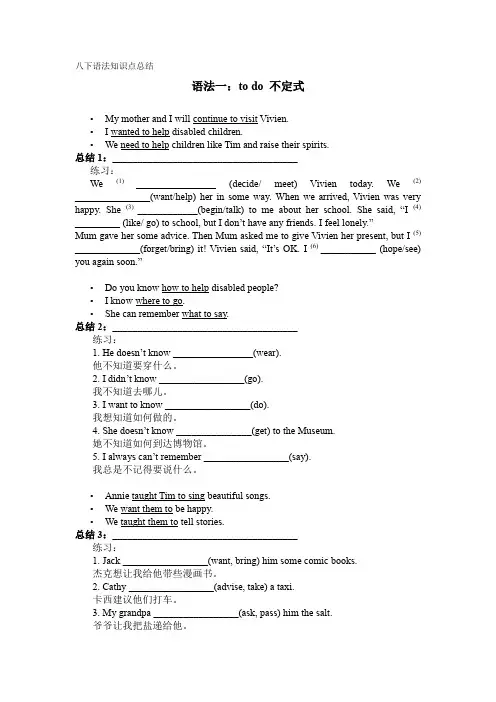
八下语法知识点总结语法一:to do 不定式•My mother and I will continue to visit Vivien.•I wanted to help disabled children.•We need to help children like Tim and raise their spirits.总结1:_____________________________________练习:We (1) ________________ (decide/ meet) Vivien today. We (2) _______________(want/help) her in some way. When we arrived, Vivien was very happy. She (3) ____________(begin/talk) to me about her school. She said, “I (4) _________ (like/ go) to school, but I don’t have any friends. I feel lonely.”Mum gave her some advice. Then Mum asked me to give Vivien her present, but I (5) _____________(forget/bring) it! Vivien said, “It’s OK. I (6) ___________ (hope/see) you again soon.”•Do you know how to help disabled people?•I know where to go.•She can remember what to say.总结2:_____________________________________练习:1. He doesn’t know ________________(wear).他不知道要穿什么。
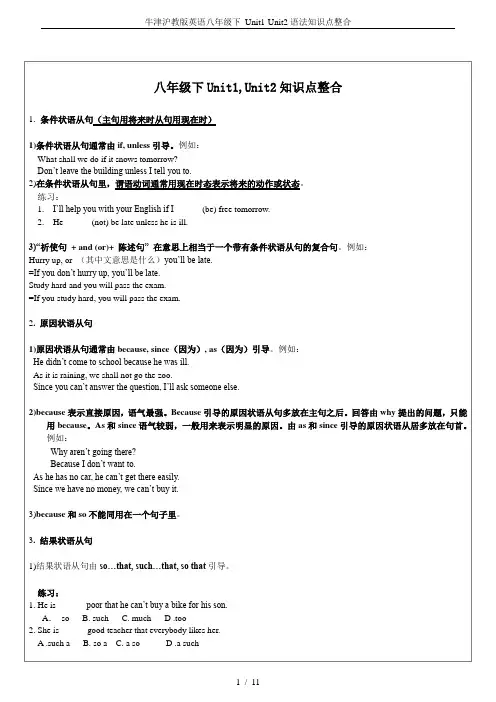
A .don't make B. not make C. not making D .not to make8. An army spokesman stressed that all the soldiers had been ordered _____clear warnings before firing any shots.A .to issue B. being issued C. to have issued D. to be issued9. I'd rather have a room of my own, however small it is, than_______ a room with someone else.A. to shareB. to have sharedC. shareD. sharing10. The bank is reported in the local newspaper_________ in broad daylight yesterday.A. robbedB. to have been robbedC. being robbedD. having been robbed11. A number of paintings in the castle are believed ________in a fire.A. being destroyedB. having been destroyedC. to be destroyedD. to have been destroyed12. The meeting _______ next week is sure to be a great success.A. to take placeB. to be taken placeC. to have taken placeD. being taken place13. As a result of my laziness, I failed ________ my work in time.A. and finishedB. to finishC. and finishingD. to finished14. I am sorry ______ written you a letter at the time.A. to have notB. to not haveC. not to haveD. not having15. Will you lend him a magazine _________?A. to be readB. for readingC. to readD. he read16. He could do nothing but _______for the bus _________.A. wait, to comeB. wait; comeC. waiting; comingD. waited; came17 .It is a problem that doesn't need ________ right now.A. to solveB. solvingC. being solvedD. to be solving18. There's a man at the reception desk who seems very angry and I think he means _______ trouble.A. makingB. to makeC. to have madeD. having made19. I remember _______him _______the bike needed __________.A. hearing, saying, to repairB. to hear, say, to repairC. hearing, say, repairingD. to hear, saying, to be repaired20. --- You should have thanked her before you left.--- I meant _________, but when I was leaving I couldn't find her anywhere.A. to doB. toC. doingD. doing so21. Robert is said to __________ abroad, but I don't know what country he studied in.A. to have studiedB. to study B. to be studying D. to have been studying22. I'm gong to Xi'an next week. Have you anything __________ to your parents?A. to takeB. to be takenC. to be bought toD. to buy23. when are they __________ in their plan?A. handB. handedC. to handD. give24. In such dry weather, the flowers will have to be watered if they _____________.A. have survivedB. are to surviveC. would survivedD. will survive25. When we hurried to the station, there happened ________ no bus at that time.A. to haveB. to beC. havingD. being26. I lost my way in complete darkness and, _________ matters worse, it began to rain.A. madeB. having madeC. makingD. to make27. At ________ time does the salesgirl get up late in the morning, though she is always too busy _________a good rest.A. no, to takeB. no, takingC. any, to takeD. one, taking28. --Are you a student? --No, but I used _________.A. to beB. to wasC. to doD. to be a29. I stopped to listen, and my son seemed _________ himself _________ in the living room.A. to enjoy, to shutB. to be enjoying, shuttingC. to be enjoying, shutD. to have enjoyed, having shut30. With a lot of difficult problems _________, the newly-elected president is having a hard time.A. settledB. settlingC. to settleD. being settled31. We're leaving at six o'clock, and hope _________ most of the journey by lunch time.A. to doB. to have doneC. to makeD. to have made32. The study of the wild world may help to make the world easier _________.A. understoodB. to be understoodC. to understandD. understand33. Who will you get __________ the project for us?A. designB. to designC. designedD. designing34. It is said in Australia there is more land than the government know __________.A. it what to do withB. what to do it withC. what to do with itD. to do what with it35. We are not allowed __________ outdoors with some other children.A. playingB. to be playingC. to playD. be playing36. Allen had to call a taxi because the box was _________ to carry all the way home.A. much too heavyB. too much heavyC. heavy too muchD. too heavy much37. She feels so strongly that each of us should have a role __________in making the earth a better place to live in.A. to have playedB. to playC. to be playedD. to be playing38. When I handed the report to John, he said that George was the person _________.A. to sendB. for sending itC. to send it toD. for sending it to39. Do let your mother know all the truth, she appears _________ everything.A. to tellB. to be toldC. to be tellingD. to have been told11 / 11。
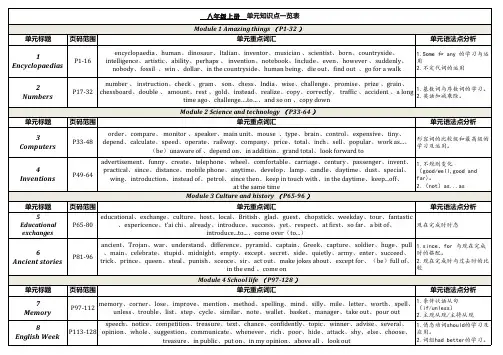
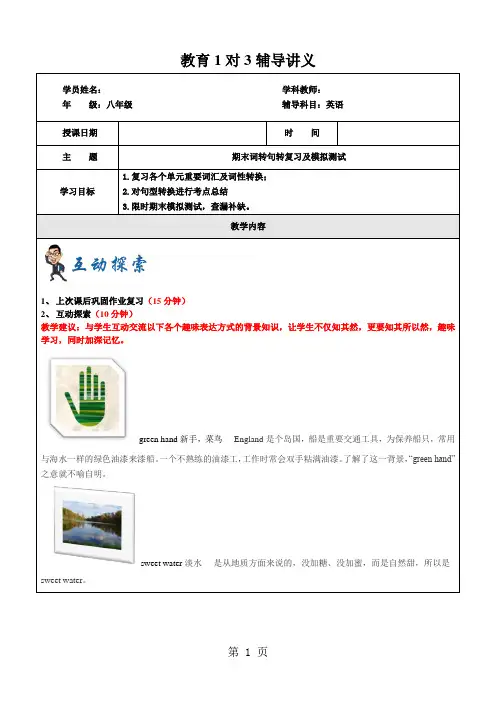
教育1对3辅导讲义1、上次课后巩固作业复习(15分钟)2、互动探索(10分钟)教学建议:与学生互动交流以下各个趣味表达方式的背景知识,让学生不仅知其然,更要知其所以然,趣味学习,同时加深记忆。
green hand新手,菜鸟----England是个岛国,船是重要交通工具,为保养船只,常用与海水一样的绿色油漆来漆船。
一个不熟练的油漆工,工作时常会双手粘满油漆。
了解了这一背景,“green hand”之意就不喻自明。
sweet water淡水----是从地质方面来说的,没加糖、没加蜜,而是自然甜,所以是sweet water。
black tea红茶----有一种说法是因为西方人相对注重茶叶的颜色,因此称之为“black(黑)”,而中国人相对注重茶汤的颜色,因此称之为“红”Greek gift图谋害人的礼物----来源于著名的"特洛伊战争":特洛伊战争中希腊人使用"木马计",特洛伊人将希腊人留下的"礼物"--大木马拖进城,导致藏在木马中的希腊人与城外大军里应外合,摧毁了特洛伊城。
"Greek gift"就是指那只木马,后来用来比喻"存心害人的礼物",与"黄鼠狼给鸡拜年--没安好心"有异曲同工之妙。
其他rest room 厕所(不是"休息室") black art 妖术(不是"黑色艺术")service station 加油站English disease 气管炎(不是"英国病") horse sense 常识(不是"马的感觉") eleventh hour 最后时刻(不是"十一点") blind date (由第三者安排的)男女初次会面(并非"盲目约会"或"瞎约会")动词名词形容词副词U1 produce v. product n.\production n.fight v. fighter n.science n.\scientist n. scientific adj. breathe v. breath n.live v. alive adj.\living adj.nature n. natural adj.chemistry n. chemical adj.U2patience n. (im)patient adj.(un)comfortable adj. comfortably adv. puzzle v. puzzled adj.treat v. treatment n.Keys: should be \ is called \ be put \ was invited \ were asked \ were moved \ be washed \ were destroyed \ have been \ were written基础I. Multiple Choices (20%)1.The serious haze (雾霾) caused many problems. Which of the following is correct for the underlined word inthe sentence?A) / siəriəs/ B) /si:riəs/ C) /`seriəs/ D) /'si:əriəs /2.Which of the following underlined parts is different in pronunciation from the others?A) The soldiers opened the secret door. B) Never jump into conclusions!C) Pet dogs often create a lot of mess. D)Ken told us a recent case.3.The Double Ninth Festival reminds us to respect ________ elderly.A) a B)an C)the D)/4.--Do you know the Mo Yan?--Of course .He won the 2019 Nobel Prize for Literature the age of 57.A)in B)at C)on D)to5.Damin usually sells some of the fish and shares________ with his twelve cormorants.A) other B) another C) the other D) the rest6.Have you heard the latest news? There's been_______ earthquake in Japan.A) other B) another C) the other D) others7.What he told me about the history of the Internet sounds________.A) friendly B) wonderfully C) boring D) uninterested8.People waste ________ electricity every day. It's time to take action.A) a large number of B) huge amounts of C) many D) quite a lot9.________ unforgettable experience it is! I'll remember it forever.A) How B) What C) What a D) What an10.The CN TV Tower (which is in Canada) is a building.A) 553 meters tall B) 553-meters tall C) 553-meters-tall D) 553-meter-tall11.All the street lights ________ because of the power cut (断电) last night.A) went on B) went out C) went down D) went up12.As people get old, their short-term memory becomes and they can't remember things quickly.A. goodB. betterC. badD. worse13.I you many times that smoking in the bedroom is dangerous and it may cause a fire.A) tell B)told C) have told D) am telling14.John ________ any money from his parents because he can earn money by himself now.A) needn't to B) doesn't need to C) doesn't need D) needn't15.Jim has never been back to his hometown ________ he went aboard three years ago.Yes. …..II.Read the passage and fill in the blanks with proper words. (One word or each blank, the first letter has been given)10%Babies love chocolate---and sometimes they also eat the paper o________ it. My cat enjoys a meal of good, thick paper, old letters, for example. She doesn’t like newspapers very much.O f course, the best paper come from wood. Wood comes from trees, and trees are plants. V________ and fruit are plants too, and we eat a lot of them. So can we also eat wood and paper?S cientists say, “All food comes in some way from plants,” Well, is that true? Animals eat grass and grow fat.Then we eat their meat. Little fish eat little seaplants; then bigger fish swim along and eat them. Chickens eat bits of grass and give us e________. Think for a minute. What food does not come from plants in some way?S cientists can do wonderful things with plants. They can make food just like meat and cheese. And they can make it w________ the help of animals. It is very good food too. Now they have begun to say, “We make out paper from wood. We can also make food from wood. The next thing is not very difficult.”W hat is the next thing? Perhaps it is ---- food from paper. Scientists say, :We can t________ paper into food, it will be good, cheap food too: cheaper than meat or fish or eggs, So please keep your old books and letters. One day, soon they will be on your plate. There is nothing like a good story for breakfast.Of vegetables eggs without turnIII.Writing: Pleat write at least 60 works about the topic ”The Changes that Internet Has Brought Us”. 10%一、词性转换出题思路及解题技巧二、句型转换解题要领变为否定句与一般疑问句①不规则变化的动词形式(AAA型,ABC型,ABA型)②词尾加-d变化的过去式在变回原型时不要漏掉e③have/has/ had的处理④原句中有do/did/does时,变为否定句时,不要忘记变为do⑤不加not 的否定:both/neither或者all/none的转换划线部分提问①一些生僻的:how tall, how heavy, how fast,how late②注意how long和how soon区别③不是出现地点就用where,也有可能用what④不是出现次数就用how often 也有可能是how many times⑤不是出现一段时间就用how long, 也有可能是how far⑥注意还原法(拓展到阅读回答问题句式)⑦要注意不被划线的成分一定会出现,被划线的部分一定不能出现感叹句①省略形容词的情况②不可数名词有量词加a/an情况③形容词和副词需转换情况good/well反义疑问句①have/has/had的处理②如果主语为名词,最后转换必须为代词③否定代词和否定副词为否定,前缀后缀不算做否定④祈使句的反义疑问句(除let’s外全用,will you?不管肯定还是否定)⑤must表示推测,后面用can’t, 表示必须后面用mustn’t。
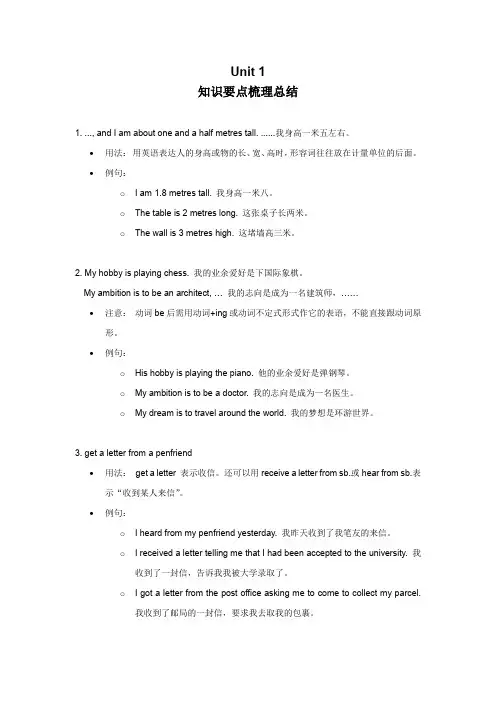
Unit 1知识要点梳理总结1. ..., and I am about one and a half metres tall. ......我身高一米五左右。
•用法:用英语表达人的身高或物的长、宽、高时,形容词往往放在计量单位的后面。
•例句:o I am 1.8 metres tall. 我身高一米八。
o The table is 2 metres long. 这张桌子长两米。
o The wall is 3 metres high. 这堵墙高三米。
2. My hobby is playing chess. 我的业余爱好是下国际象棋。
My ambition is to be an architect, … 我的志向是成为一名建筑师,……•注意:动词be后需用动词+ing或动词不定式形式作它的表语,不能直接跟动词原形。
•例句:o His hobby is playing the piano. 他的业余爱好是弹钢琴。
o My ambition is to be a doctor. 我的志向是成为一名医生。
o My dream is to travel around the world. 我的梦想是环游世界。
3. get a letter from a penfriend•用法:get a letter 表示收信。
还可以用receive a letter from sb.或hear from sb.表示“收到某人来信”。
•例句:o I heard from my penfriend yesterday. 我昨天收到了我笔友的来信。
o I received a letter telling me that I had been accepted to the university. 我收到了一封信,告诉我我被大学录取了。
o I got a letter from the post office asking me to come to collect my parcel.我收到了邮局的一封信,要求我去取我的包裹。
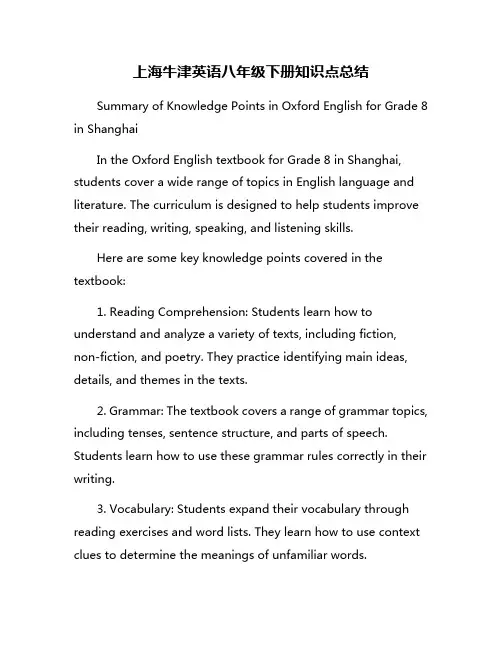
上海牛津英语八年级下册知识点总结Summary of Knowledge Points in Oxford English for Grade 8 in ShanghaiIn the Oxford English textbook for Grade 8 in Shanghai, students cover a wide range of topics in English language and literature. The curriculum is designed to help students improve their reading, writing, speaking, and listening skills.Here are some key knowledge points covered in the textbook:1. Reading Comprehension: Students learn how to understand and analyze a variety of texts, including fiction,non-fiction, and poetry. They practice identifying main ideas, details, and themes in the texts.2. Grammar: The textbook covers a range of grammar topics, including tenses, sentence structure, and parts of speech. Students learn how to use these grammar rules correctly in their writing.3. Vocabulary: Students expand their vocabulary through reading exercises and word lists. They learn how to use context clues to determine the meanings of unfamiliar words.4. Writing: Students practice writing different types of texts, such as essays, letters, and reports. They learn how to structure their writing and develop their ideas effectively.5. Speaking and Listening: Students practice their speaking and listening skills through group discussions, presentations, and listening exercises. They learn how to communicate effectively in various situations.Overall, the Oxford English textbook for Grade 8 in Shanghai provides students with a comprehensive English language education. By mastering the knowledge points in the textbook, students can improve their English skills and become more proficient speakers, readers, and writers.。
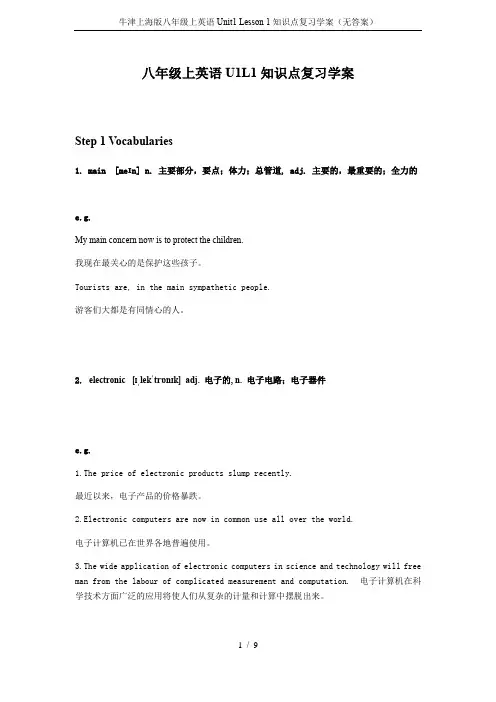
八年级上英语U1L1知识点复习学案Step 1 Vocabularies1.main [meɪn] n. 主要部分,要点;体力;总管道, adj. 主要的,最重要的;全力的e.g.My main concern now is to protect the children.我现在最关心的是保护这些孩子。
Tourists are, in the main sympathetic people.游客们大都是有同情心的人。
2.electronic [ɪˌlekˈtrɒnɪk] adj. 电子的, n. 电子电路;电子器件e.g.1.The price of electronic products slump recently.最近以来,电子产品的价格暴跌。
2.Electronic computers are now in common use all over the world.电子计算机已在世界各地普遍使用。
3.The wide application of electronic computers in science and technology will free man from the labour of complicated measurement and computation. 电子计算机在科学技术方面广泛的应用将使人们从复杂的计量和计算中摆脱出来。
3.process ['prəʊses] vt. 处理;加工; n. 过程,进行;方法,步骤;作用;程序;推移; vi. 列队前进adj. 经过特殊加工(或处理)的e.g.Brazil began importing soybeans to process at home.巴西开始进口大豆在国内加工。
Building a car is a long process.制造一辆小汽车有很长的工序。
4.control[kən'trəʊl] n. 控制;管理;抑制;操纵装置,vt. 控制;管理;抑制e.g.The restructuring involves Mr. Ronson giving up control of the company.公司重组需要罗森先生放弃对公司的控制。
精品资料 1 / 11用心 爱心 专心 初二牛津英语知识点复习 M3 U1 1. Save one’s life 生命可数 2. Have a happy life 生活不可数 3. Long ago 4. A poor farmer 5. Have a lot of pocket money 6. Be poor at 7. Would you like sth? = do you want sth? Yes please. No thanks. 8. Would you like to do?=do you want to do? Yes I like. No I wouldn’t. 9. Would you like sb to do sth? Yes of course! No you needn’t. 10. Live happily together 11. In their tiny old hut 12. Visit someone 13. Call on sb 拜访 14. Call at sp参观 15. One winter night=on winter night 16. Smile at each other=look at sb smilingly 17. Many wishes 18. I wish+(将来) 19. I wish+(过去/过去完成)(虚拟) I wish he did’t die at the time. I wish I were you.(虚拟语气谓语动词用复数 ) 20. Make +动词+宾语 21. Keep us healthy 22. Keep health 23. Healthily healthier 24. Although 让步状语从句-强调(尽管),没有but 25. Earn very little money 26. 定语前置(形容词,名词,分词) 27. 定语后置(定语/状语从句,名词短语) 28. User usage use 29. How about=what about 30. Be …… from 31. Appearance(外形) -appear-disappear 32. Differ a from b 33. save (time/money)in doing sth
u2 1. wake up 2. plants growing(名词修饰名词) 3. awful=terrible 4. it is adj for sb to do sth. (it is 为形式主语,to do 为真正主语) 5. 当表示客观事实或是必然现象时遇到主将从现的巨型主语与从句都用现在时(it is awful to walk in the streets when the weather is wet.) 6. An exciting time of the year 7. Start getting warm/warmer 8. Blow gently 9. It is wet everywhere 10. Start growing on the trees 11. The animals which……(定语从句) 12. By give each other chocolate eggs(how) 13. Make sb do(自己能发出动作的) 14. Make sb done(无法发出动作) 15. Be full of =be filled with 16. Hot-heat-hotter 17. Bright=clever/enough light 18. Love going to the beach 19. Build sandcastles on the beach 20. There are typhoons 21. Blow a lot 精品资料 2 / 11用心 爱心 专心 22. Be in danger 23. Endangered 24. Start falling from the trees 25. Dry leaves 26. Start getting cooler 27. A little stronger 28. Eating more food 29. Warmer places 30. No eat anything in winter=eat nothing in winter 31. Just go to sleep(just是强调) 32. Love going on a picnie 33. Have a barbecue 34. On windy days 35. Put on thick coats,scarves and boots 36. In many places of the world 37. Start thinking about their Christmas presents 38. Fun to have Christmas party U3 1. May be: v 猜测,50% 2. must be:肯定的猜测 3. can’t be:一定不 4. can be:没有这个短语 5. may be: adv = perhaps 6. he isn’t here. He ______(maybe/must be/can’t be/can be/may be) 7. must have done动作已完成 8. must be doing正在发生 9. what may happen in the future? 10. I think so – I don’t think so 11. I hope not – I hope so 12. I think that people will 13. Use petrol 14. There won’t be any air pollution 15. There will be more people 16. Enough food 17. Enough room = enough place 18. Have no place to live (动词不定式作定语) 19. Be able to(特长) can (普遍都会) 20. I hope so, but I don’t think so. 21. Be able to live in space stations on the moon 22. Be able to grow vegetables there 23. Speak the same language 24. People in different countries 25. Understand each other better 26. Learn from computers at home 27. Travel by spacecraft 28. Cities under the sea 29. Take pills only 30. In twenty year’s time 31. Have enough food to eat 32. Make a time box 33. Write down what you think may happen in twenty years time 34. Put all the pieces of paper into a box 35. Then close the box U4 1. Enjoyable-enjoy-joy 2. Want her students to conduct a survey for the school 3. Find out 4. Find 5. Changes students would like to see in our school 6. Have a swimming pool 精品资料 3 / 11用心 爱心 专心 7. They failed in the test, didn’t they?(failed 意思是否定,但句型是肯定的) 8. In PE lessons 9. Have computer lessons 10. Have more children’s magazines to read 11. Sit in groups 12. Need to move our desks 13. Have a discussion 14. Study in an air-conditioned classroom ( air-conditioner) 15. Have less homework 16. Feel very uncomfortable (comfort) 17. Spend on doing 18. Suggested changes 19. Have a science laboratory 20. Have cookery lessons 21. Have more display board 22. Have more books and children’s magazines in our school picnic twice a year 23. Places of interest=interesting places 24. Have a lift in school 25. Have more interest clubs 26. It would be… 27. Think about 28. Change a into b 29. Have more books to share among them selves 30. Put some thick paper boards out side the classroom in the corridor 31. Use sth as sth 32. Put some thick paper boards outside the classroom in the corridor 33. It would be adj to do. 34. Learn to work more quickly herself 35. Organize one more school picnic himself 36. Agree on the data 37. Agree to sth 38. Agree to do 39. Agree with M4 u1 1. Be important to 2. Going to show a video 3. Tell you a lot about electricity 4. It is adj for/of sb to do sth.(to do 为主语) It is adj to sb.(无主语时,for/of 变成 to,to为方向介词) 5. Electric(a)-some thing about electricity-Electrical(a)something use electricity-Electronic(电子的)-electricity(电)-electrician(电工) 6. On a dark night 7. The lightning flashes 8. The thunder crashes 9. Something in the wire gave him a fright 10. Fright-frighten-frightened-frightening 11. What could it be 12. Use the lightning to do 13. It would be too frightening 14. Make some steam 15. Make sb/sth do(do 为宾补) 16. Make steam to drive…(drive 为目的状语,make &drive 中间加to 是动词不定式) 17. See the pylons carrying 18. What do they bring 19. Comes into our home 20. Look at the plugs and lights in every room 21. Gives power for lights 22. What else 放于所修饰的词后 23. Electrical appliances